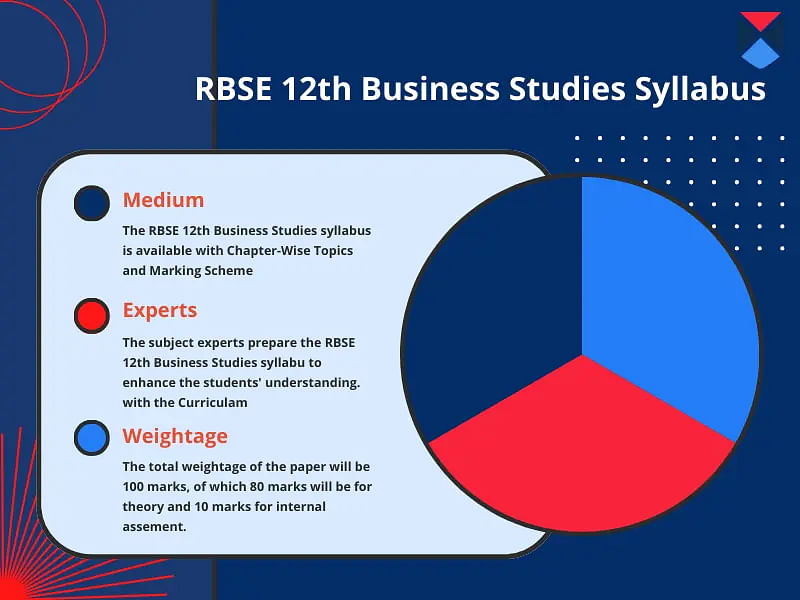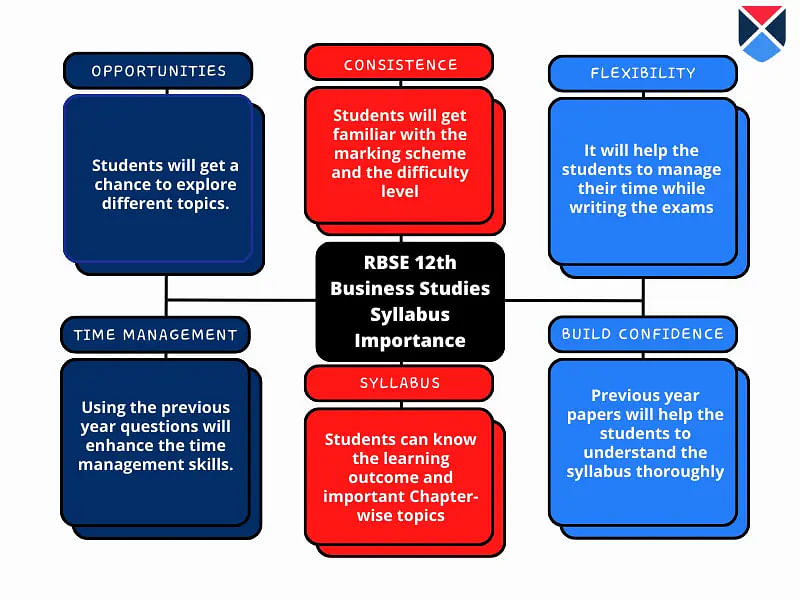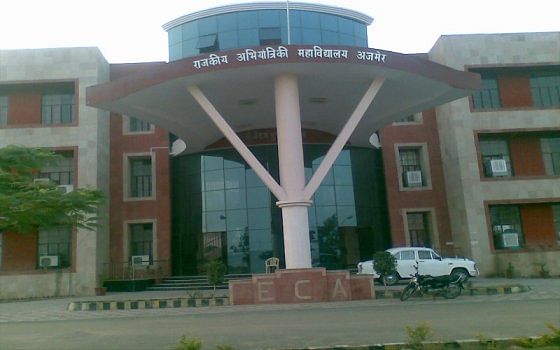RBSE Class 12 Business Studies Latest Syllabus 2025-26: Download Latest and Revised RBSE Class 12th Business Studies Syllabus PDF
Table of Contents
- RBSE 12th Business Studies Syllabus 2026: Download
- RBSE 12th Business Studies Syllabus 2023-24: PDF Download
- RBSE 12th 2026 Business Studies Syllabus: Chapter-Wise Topics
- Class 12 Business Studies Syllabus 2026 RBSE: Chapter-Wise Marking Scheme
- RBSE 12th Business Studies Syllabus 2026: Preparation Tips
The RBSE 12th Business Studies syllabus 2026 includes chapters on Principles of Management, Business Environment, Planning, Organizing, and more. It is the fundamental blueprint for students and teachers, setting clear objectives and expectations regarding the academic structure.
The class 12 Business Studies syllabus 2026 RBSE entails all the academic instructions and learning outcomes. It provides a conceptual framework for the chapters, topics, and subtopics to be covered in the RBSE 12th exam for Business Studies.
RBSE 12th Business Studies Syllabus 2026: Download
The board will release the RBSE class 12th Business Studies syllabus 2026 on the official website. The direct link to download the syllabus will be provided below for the student's reference.
| Particulars | PDF Link |
| RBSE 12th 2026 Business Studies Syllabus | To be updated |
RBSE 12th Business Studies Syllabus 2023-24: PDF Download
Students need to review each chapter in the syllabus for a better understanding of the subject matter. Students should also go through the RBSE 12th books which are curated based on the recent syllabus.
The table below contains the RBSE 12th 2023-24 Business Studies syllabus which can be downloaded in PDF format.
| Particulars | PDF Link |
| RBSE 12th Business Studies Syllabus 2023-24 | Download Now |
Check For All Subjects: RBSE 12th syllabus 2026
RBSE 12th 2026 Business Studies Syllabus: Chapter-Wise Topics
The class 12 Business Studies syllabus 2026 RBSE is categorized into two sections which include chapters based on business management, financial management, and customer protection.
A detailed review of the RBSE 12th previous question papers can help students learn the topic allocation from the syllabus. Check the chapter-wise topics given in the table below as per the recent syllabus.
| Units | Topics |
| Principles and Functions of Management | Introduction |
| Concept, Nature, and Significance | |
| Principles of Scientific Management | |
| Techniques of Scientific Management | |
| Feyol's Principles of Management | |
| Fayol versus Taylor-A Comprasion | |
| Nature and Significance of Management | Introduction |
| Concept | |
| Objectives, importance, and Nature of Management | |
| Characteristics of Management | |
| Management as Art | |
| Management as Profession | |
| Management as Science | |
| Levels of Management | |
| Coordination | |
| Importance of Coordination | |
| Characteristics of Coordination | |
| Management in the 21st-century | |
| Business Environment | Introduction |
| Meaning of Business Environment | |
| Importance of Business Environment | |
| Dimension of Business Environment | |
| Liberalization, Privatisation, and Globalization | |
| Economic Environment in India | |
| Demonetization | |
| Organising | Introduction |
| Meaning | |
| Concept of Organising | |
| Importance of Organising | |
| Steps in the Process of Organising | |
| Organisation Structure | |
| Types of Organization Structures - Functional Structure, Divisional Structure | |
| Formal and Informal Organisation | |
| Delegation | |
| Elements of Delegation | |
| Centralisation and Decentralisation- Meaning and Importance | |
| Planning | Introduction |
| Meaning and Importance of Planning | |
| Features and Limitations of Planning | |
| Planning Process | |
| Types of Plans | |
| Objectives, Strategy, Policy, Procedure, Method, Rule, Programme, and Budget | |
| Staffing | Meaning and Importance of Staffing |
| Evolution of Human Resource Management | |
| Staffing Process | |
| Recruitment | |
| Sources of Recruitment-Internal and External | |
| Selection | |
| Importance of Training and Development | |
| Training Method:- On the JOB, Off the Job | |
| Controlling | Meaning, Importance, and Limitations of Controlling |
| Relationship between planning and Controlling | |
| Controlling Process | |
| Directing | Meaning, Characteristics, Elements, and Importance of Directing |
| Supervision and its Importance | |
| Motivation, Motivation Process | |
| Maslow's need Hierarchy theory of motivation | |
| Financial and Non-Financial Incentives | |
| Leadership | |
| Features and Importance of Leadership | |
| Leadership Style | |
| Communication | |
| Element and Importance of Communication Process | |
| Formal and Informal Communication Process | |
| Grapevine Network | |
| Barriers to Communication | |
| Improving Communication Effectiveness | |
| Marketing | Meaning, Concept, and Function of Marketing |
| Marketing Management Philosophies | |
| Marketing mix | |
| Products, Classification of products | |
| Branding | |
| Characteristics of good brand name | |
| Levels, Importance, and Function of Packaging | |
| Labeling and function of labeling | |
| Factors Affecting Price Determination | |
| Physical Distribution | |
| Components of Physical Distribution | |
| Promotion mix | |
| Meaning, Merits, and importance of advertising | |
| Meaning, Role, and aim of personal selling | |
| Sales Promotion | |
| Profit and Limitation of Sales Promotion | |
| Commonly used sales promotion activities | |
| Difference between advertising and personal selling | |
| Role of Public Relations | |
| Financial Management | Introduction |
| Meaning of Business Finance and Objectives | |
| Financial Decisions | |
| Factors Affecting Dividend Decision | |
| Financial Planning | |
| Importance of Financial Planning | |
| Capital Structure | |
| Factors affecting the choice of capital Structure | |
| Fixed Capital Management of Fixed Capital | |
| Factors Affecting the Requirement of Fixed Capital | |
| Working Capital | |
| Factors Affecting the Working Capital Requirements | |
| Consumer Protection | Introduction |
| Importance of Consumer Protection | |
| The Consumer Protection Act, 2019 | |
| Consumer Rights | |
| Consumer Responsibilities | |
| Ways and means of consumer protection | |
| Redressal Agencies under the Consumer Protection ACT | |
| Role of Consumer Organizations and NGO |
Check the overview of the RBSE 12th 2026 Business Studies syllabus illustrated below.

Class 12 Business Studies Syllabus 2026 RBSE: Chapter-Wise Marking Scheme
A total of 100 marks is assigned for the Business Studies exam which is divided into two parts. The theory paper contains 80 marks and the rest of the 20 marks are allocated for the practical exam.
A thorough review of the syllabus will help candidates gain a comprehensive understanding of the RBSE 12th exam pattern 2026 for Business Studies. The chapter-wise marking allocation is given in the table below as per the RBSE 12th 2026 Business Studies syllabus.
| Units | Marks |
| Management | 6 |
| Principles of Management | 7 |
| Business Environment | 3 |
| Planning | 6 |
| Organisaing | 8 |
| Staffing | 7 |
| Directing | 8 |
| Controlling | 5 |
| Financial Management | 8 |
| Financial Markets | 7 |
| Marketing | 8 |
| Consumer Protection | 7 |
RBSE 12th Business Studies Syllabus 2026: Preparation Tips
The Rajasthan Board of Secondary Education has provided the syllabus so that students can understand curricular objectives and prepare effectively for the upcoming board exams. Check the following tips that can help students with their preparation.
- Students should cover all the chapters mentioned in the syllabus as the question papers in the exam will be set from it.
- Prepare a study routine and timetable to cover the whole syllabus at least three months before the exam.
- Highlight the important topics which are important to revise before the exam.
- Review the syllabus before the exam if any topics are left to be covered.
- Check the chapter-wise marking allocation by reviewing the syllabus thoroughly.
- Prepare short notes that are helpful for last-minute preparations.


![Maharshi Dayanand Saraswati University, [MDSU] Ajmer](https://media.getmyuni.com/azure/college-image/small/maharshi-dayanand-saraswati-university-mdsu-ajmer.webp)





![Ajmer Institute of Technology, [AIT] Ajmer](https://media.getmyuni.com/azure/college-image/small/ajmer-institute-of-technology-ait-ajmer.jpg)

![Aryabhatta College of Engineering and Research Centre, [ACERC] Ajmer](https://media.getmyuni.com/azure/college-image/small/aryabhatta-college-of-engineering-and-research-centre-acerc-ajmer.jpg)





















